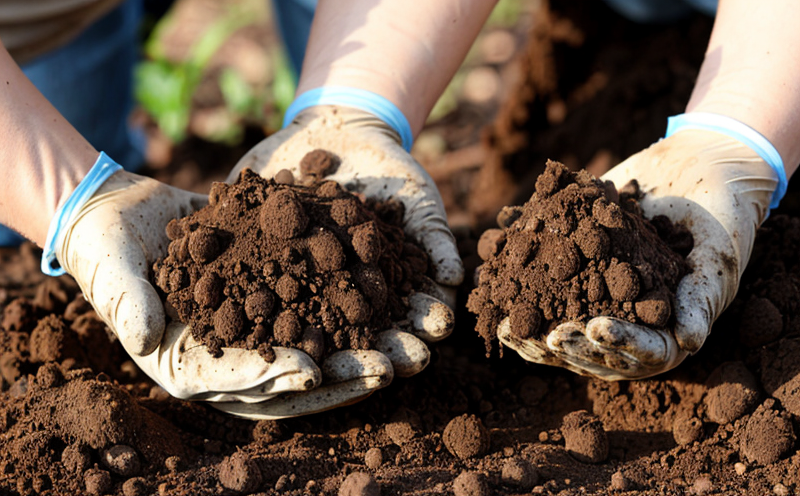ISO 11274 Soil Microbial Water Retention Testing
The ISO 11274 standard provides a robust method for evaluating soil microbial water retention properties, which are crucial in understanding the moisture availability to microorganisms within different types of soil. This testing is essential for various applications including agricultural research, ecological studies, and environmental impact assessments. The procedure involves measuring the amount of water retained by soils at varying degrees of matric potential, thereby providing insights into how microbial activity might be influenced by water stress.
The test setup typically includes a pressure chamber that allows precise measurement of soil moisture under controlled conditions. Specimens are prepared from representative samples taken from field sites or laboratory simulations, ensuring that the results reflect real-world scenarios. After preparation, soils are equilibrated in air to remove excess surface water before being placed inside the pressure chamber.
During testing, pressures are applied incrementally, and changes in soil weight are monitored as a function of time. These data points help determine the soil's water retention characteristics across different matric potentials. This information is vital for assessing the health and resilience of microbial communities that play key roles in nutrient cycling and overall ecosystem functioning.
Compliance with ISO 11274 ensures consistency and reliability of results, which are critical when comparing data from multiple studies or sites. The standard also emphasizes the importance of proper sample handling and conditioning to avoid biases introduced by improper procedures. Understanding these nuances is essential for accurate interpretation of test outcomes.
For practitioners in agriculture and environmental science, this testing method provides a valuable tool for optimizing soil management practices aimed at enhancing microbial activity without overwatering. In ecological studies, it aids in predicting how changes in climate or land use might affect soil health and associated biota. By adhering to ISO 11274 guidelines, researchers can ensure that their findings are comparable and applicable across diverse environments.
- Ensures consistent measurement of soil water retention properties.
- Aids in understanding the impact of different soil types on microbial activity.
- Supports accurate prediction of ecosystem responses to environmental changes.
- Facilitates better agricultural practices by optimizing irrigation schedules and techniques.
Applied Standards
The ISO 11274 standard is complemented by other relevant international standards such as ISO 8578, which covers soil moisture measurement using the oven-drying method. Together, these standards provide a comprehensive framework for assessing various aspects of soil water content and its impact on microbial activity.
For instance, ISO 14618 deals with the determination of soil organic matter, which is closely related to soil structure and microbial interactions. Understanding both moisture retention properties and organic content can give a more holistic view of soil health and functionality.
Additionally, ISO 27503 pertains to the determination of soil pH, an important parameter influencing microbial activity as it affects nutrient availability and chemical reactions within the soil matrix. By integrating these standards into comprehensive testing protocols, laboratories can offer clients a more integrated approach to soil analysis.
Quality and Reliability Assurance
The quality of ISO 11274 testing is maintained through rigorous calibration procedures for all equipment involved in the process. Regular maintenance schedules ensure that instruments remain accurate throughout their operational lifetimes.
Data integrity is protected by implementing strict protocols for sample handling and recording, ensuring that every step from collection to analysis adheres strictly to the prescribed methodology. This includes careful documentation of environmental conditions at each sampling site to account for potential variability in field settings.
Inter-laboratory comparisons are conducted periodically to verify consistency among different testing facilities. These exercises help identify any discrepancies or deviations that may arise due to variations in technique, equipment, or interpretation. By fostering a culture of continuous improvement, such practices enhance the overall reliability and validity of test results produced under ISO 11274.
Moreover, adherence to these quality assurance measures not only enhances the credibility of individual tests but also contributes to broader scientific endeavors by providing standardized data points that are universally comparable. This is particularly beneficial in collaborative projects involving multiple institutions or countries working towards common goals related to soil science and environmental sustainability.
Competitive Advantage and Market Impact
Offering ISO 11274 testing offers significant competitive advantages in several key areas. Firstly, it establishes your laboratory as a leader in providing precise and reliable soil microbial water retention data, which is increasingly valued by clients seeking to optimize their agricultural practices or environmental management strategies.
Secondly, compliance with this standard ensures that all tests conducted meet internationally recognized benchmarks, thereby enhancing the reputation of both the service provider and its clients. This can be particularly advantageous in gaining competitive edge over other providers who may not have such stringent quality controls in place.
In addition to these direct benefits, offering ISO 11274 testing opens up new market opportunities within sectors where accurate soil analysis plays a crucial role, including but not limited to agriculture, horticulture, and environmental consulting firms. As awareness grows about the importance of sustainable land management practices, demand for high-quality soil testing services is expected to increase.
Furthermore, by leveraging advanced analytical techniques supported by ISO 11274 compliance, laboratories can provide clients with detailed insights into their specific needs, helping them make informed decisions regarding resource allocation and operational strategies. This personalized service approach not only strengthens client relationships but also positions the laboratory as an indispensable partner in achieving long-term success.





